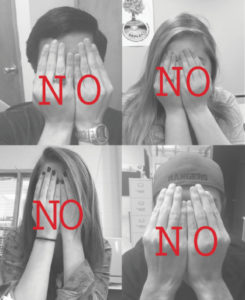By NATALIE SACKET
Feature Editor
 In recent weeks, cries of #freeKesha spread across social media.
In recent weeks, cries of #freeKesha spread across social media.
The 28-year-old pop star is known for her light-hearted music and free spirit, but the discussion surrounding her has become far heavier.
Kesha battled in court on Feb. 19 against a man who sexually and emotionally assaulted her. She battled not to send him to prison or for financial retribution, but merely in order to sever her contract with Sony so she no longer has to work with her assaulter in following years.
But Kesha did not win her court case. A judge had the power to decide whether or not Kesha had actually been raped, and because there lacked sufficient evidence, the judge decided in favor of Sony.
In the announcement of the judge’s verdict, the once bold and fearless pop star appeared meek, crushed and lacking hope. She faced an impossible decision: quit making music, or continue with her Sony contract and working with the man who had assaulted her.
In an announcement to the public, Kesha said, “All I ever wanted was to be able to make music without being afraid, scared or abused. This case has never been about the renegotiation of my record contract – it was never about getting a bigger, or a better deal. This is about being free from my abuser.”
Kesha no longer fights for her rights alone.
“At this point, this issue is bigger than just about me,” Kesha said. “I think about young girls today – I don’t want my future daughter – or your daughter – or any person to be afraid that they will be punished if they speak out about being abused, especially if their abuser is in a position of power.”
Kesha’s story is but one regarding sexual assault that has been on the forefront of news lately.
At the Academy Awards last Sunday, Vice President Joe Biden introduced Lady Gaga’s performance of “Til it Happens to You.” The song was written for a documentary regarding sexual assault on campuses. Biden’s appearance was to emphasize the need of a cultural change in regards to the rape culture that has been created.
“Despite significant progress over the last few years, too many women and men on and off college campuses are still victims of sexual abuse,” he said. “Tonight, I’m asking you to join millions of Americans to take the pledge: a pledge that says that I will intervene in situations when consent has not or cannot be given. Let’s change the culture.”
Biden continued, “We must and we can change the culture so that no abused woman or man has to ask, ‘what did I do?’ They did nothing wrong.”
He then encouraged viewers to visit itsonus.org to take the pledge of changing this culture.
Lady Gaga, who has revealed that she was raped in the past, delivered a passionate performance. During this, college students filled the stage bearing black writing on their arms saying encouragement like “it’s not your fault” and “survivor.” It was a chilling performance and one that brought many of the audience members to tears. The lyrics to her song resonate with the anti-rape movement. “How could you know ‘til it happens to you?”
These cases are closer to home as well. Last month, a 12-year-old male and a 16-year-old male were sexually assaulted by four teammates on their wrestling team. Last month, a “men’s rights” group organized a meeting in Oklahoma City for individuals who desire the legalization of rape on private property. The group cancelled their meeting after they received several treats of their safety. This event was one of over 165 reported similar meetings across 43 countries.
According to the U.S. Department of Justice’s National Crime Victimization Survey, on average there are 293,066 victims of sexual assault each year. This means that every 107 seconds, another American is sexually assaulted. Many victims of sexual assault are too afraid to come forward with any allegations, understandable considering cases such as Kesha’s, in which it is proven that the court system does not always provide justice for the victim.
The foundation, It’s On Us, is entirely correct. It is on us. We need to become further educated and, in turn, educate others about changing this rape culture. It is our duty to promise to no longer be bystanders of the problem, but to actively become a part of the solution.
